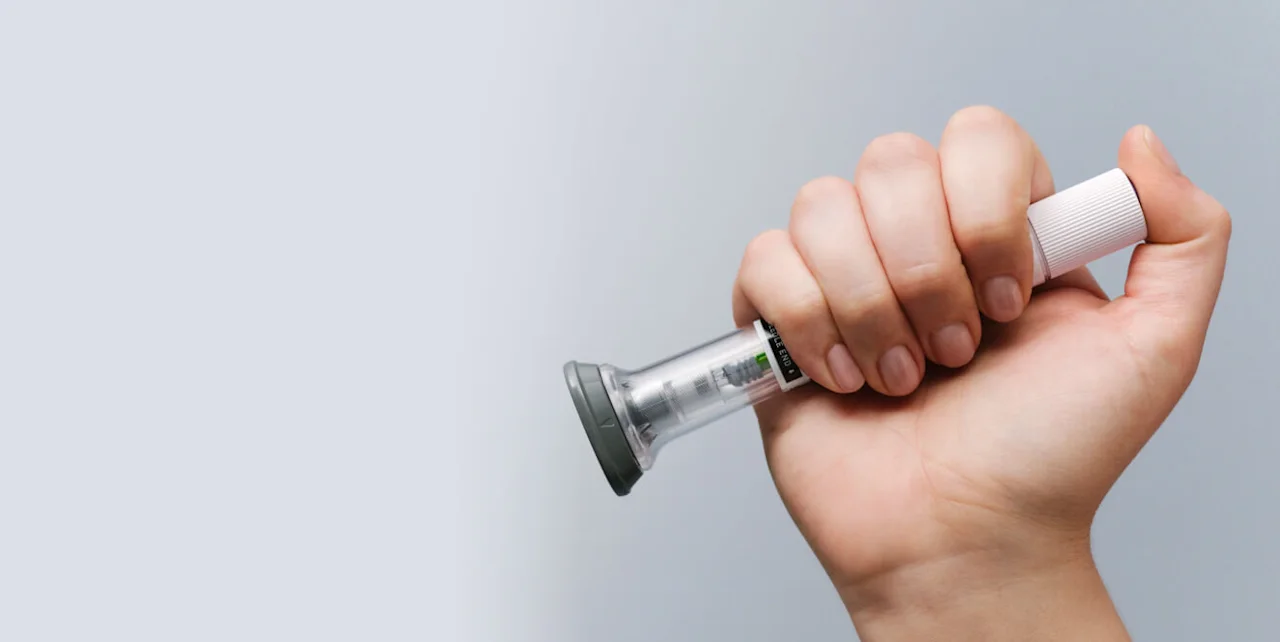Key takeaways
Dry mouth has been reported by some people while taking semaglutide. Semaglutide dry mouth could be related to dehydration from other side effects of the medication, such as nausea, vomiting, or diarrhea. More evidence is needed to know whether it’s directly caused by the medication.
Strategies to relieve dry mouth include staying hydrated, avoiding tobacco products, eating moist (not dry) foods, and considering over-the-counter and prescription aids that improve saliva production.
If dry mouth is severe, or lifestyle changes and medications are not effective, talk to your healthcare provider about trying a different medication or investigating other underlying medical causes of dry mouth.
Here's what we'll cover
Here's what we'll cover
Here's what we'll cover
Key takeaways
Dry mouth has been reported by some people while taking semaglutide. Semaglutide dry mouth could be related to dehydration from other side effects of the medication, such as nausea, vomiting, or diarrhea. More evidence is needed to know whether it’s directly caused by the medication.
Strategies to relieve dry mouth include staying hydrated, avoiding tobacco products, eating moist (not dry) foods, and considering over-the-counter and prescription aids that improve saliva production.
If dry mouth is severe, or lifestyle changes and medications are not effective, talk to your healthcare provider about trying a different medication or investigating other underlying medical causes of dry mouth.
Some side effects of semaglutide are expected. Take nausea, for instance, the most commonly reported side effect of this medication. Others, like semaglutide dry mouth, can take people by surprise. But dry mouth can happen in some cases, and when it does, it can make your day-to-day life more uncomfortable.
If you do experience semaglutide dry mouth, there are ways to manage it. Keep reading to learn why this might happen, how to manage symptoms, and what to expect.
Does semaglutide cause dry mouth?
Possibly, but in clinical studies of semaglutide involving thousands of people, dry mouth wasn’t a documented side effect. Some people say they’ve had dry mouth on semaglutide, but it’s not clear if the drug is to blame. More research is needed to know for sure.
Semaglutide is in the GLP-1 receptor agonist class of medications. It’s available under brand names Wegovy for weight loss and Ozempic or Rybelsus for type 2 diabetes treatment. Dry mouth is not listed as a common adverse reaction in the prescribing information for Wegovy, Ozempic, or Rybelsus, but there is one case series describing this phenomenon.
This case study, published in 2023, describes three female patients taking semaglutide who visited their healthcare clinic due to severe mouth dryness, as well as “minimal frothy saliva.” After underlying medical problems were excluded (such as low water intake or a condition called Sjogren’s disease) as the cause, the females were diagnosed with hyposalivation (dry mouth).
While this information is available via case studies, we need more widespread research to understand just how often this happens in people taking semaglutide. A 2022 report examining the FDA adverse event reporting system analyzed 45 side effects, finding 17 “new and unexpected” ones, including dry mouth. Since dry mouth is not currently listed on the drug label as a common adverse reaction, it can be a surprise if you’re taking semaglutide and experience low saliva or a sticky mouth.
Why does semaglutide cause dry mouth?
Semaglutide works in several ways, including decreasing appetite, improving the way your body creates and circulates insulin, and slowing gastric emptying. There are a few reasons semaglutide may predispose you to dry mouth:
May promote dehydration: Researchers suggest semaglutide may act as a diuretic (causing excess water loss from the body).
May cause side effects that dehydrate you, such as diarrhea: In trials for Wegovy, 30% of people on a 2.4 mg dose reported diarrhea, compared to 16% on placebo. For Ozempic, about 9% of those on a 1 mg dose experienced diarrhea, compared to 2% on the placebo. Diarrhea (along with vomiting, another common side effect from these medications) can cause dehydration, leading to dry mouth.
May predispose you to catching a cold: Another potential adverse reaction is the common cold, and general stuffiness can make you a mouth breather, which can cause dry mouth.
The three patients in the aforementioned case study all reported that they began to experience dry mouth about four weeks after starting semaglutide.
How long does semaglutide dry mouth last?
It’s not yet known how long semaglutide dry mouth lasts. Individual experiences seem to vary, but according to the limited evidence available, semaglutide-related dry mouth may improve within 4–16 weeks.
Here’s what the three patients from the small case study report experienced:
Case 1: A 46-year-old woman on semaglutide developed dry mouth and coated tongue. She stopped taking semaglutide, and salivary flow returned to normal within four weeks.
Case 2: A 27-year-old woman on semaglutide experienced dry mouth and chapped lips. She continued taking semaglutide and was treated with a prescription medication (pilocarpine). Her symptoms improved within four weeks.
Case 3: A 34-year-old woman on semaglutide had dry mouth and bad breath (halitosis). She chose to continue taking semaglutide and, at a follow-up visit 16 weeks later, she had improved salivary flow.
How do you manage semaglutide dry mouth? 4 approaches
Dry mouth can be a nuisance, but it can also cause oral burning, difficulty swallowing, and changes in taste that can really impact your quality of life. You have several options to find relief.
1. Manage symptoms with lifestyle changes
Lifestyle strategies that promote proper saliva production include:
Sipping water regularly (be sure to carry a water bottle around with you)
Avoiding alcohol, tobacco, and caffeine
Consuming foods that are moist and easy to chew
Using artificial saliva products (such as sprays, lozenges, or gels)
Chewing sugar-free gum or sucking on sugar-free candy
Practicing a good oral health routine
2. Use medication to treat dry mouth
If the strategies above are ineffective, your physician may consider prescription medication. Pilocarpine is one medication that may be used to treat dry mouth, as it increases salivary flow.
3. Address underlying causes of dehydration
It’s possible that dry mouth could be related to dehydration from other semaglutide side effects, such as nausea, vomiting, or diarrhea. For example, if you’re feeling queasy, you may be eating and drinking less than usual, so your overall fluid intake may be lower. This could result in dry mouth. And if you’re losing fluid through vomiting or diarrhea side effects, dehydration can happen and, in some cases, can even become severe enough to cause kidney problems.
If you are struggling with diarrhea while taking semaglutide, you can help manage diarrhea by staying hydrated, avoiding foods and drinks that promote diarrhea (like caffeine or fried or greasy food), and taking OTC antidiarrheal medications when advised by your provider.
If gastrointestinal side effects feel severe, aren’t improving, or are making it hard to stay hydrated, reach out to your healthcare provider. They can help you find ways to manage symptoms and adjust your treatment plan if needed.
4. Speak to your healthcare provider about other options
One of the foundations of dry mouth treatment is to address the underlying cause. If semaglutide is the suspected cause, then coming off of the medication (under the supervision of your healthcare provider) may help your dry mouth, especially if symptom management strategies aren’t effective. Talk to your healthcare provider about whether this is the best choice for you and other options available to you for weight management or type 2 diabetes treatment.
When to contact a healthcare provider
If you experience dry mouth that’s bothersome and impacts your comfort or ability to eat or swallow, contact your healthcare provider. Together, you can talk about an action plan to manage symptoms, try medications that promote saliva production, or consider switching to a different medication other than semaglutide, depending on your medical needs and preferences. There are a number of underlying causes for dry mouth, including autoimmune conditions like Sjogren’s disease, that your provider may want to rule out before moving forward with your treatment.
Bottom line
Semaglutide dry mouth is not considered a common side effect of the GLP-1 receptor agonist medication, semaglutide. However, there are anecdotal reports and case studies that suggest dry mouth can occur for some people. While it’s a good idea to consult your healthcare provider for any side effect that’s negatively impacting your life, here are things to keep in mind:
Dry mouth can cause sticky, thick saliva, problems eating and swallowing, and sensations of burning in the mouth.
While this side effect is rare, semaglutide may cause dry mouth for a number of reasons, including its tendency to cause dehydration, which affects saliva production.
There are several things you can do to relieve dry mouth, including taking sips of water throughout the day to stay hydrated, avoiding tobacco, using over-the-counter mouth-moisturizing products, and taking prescription meditations to improve saliva production.
In some cases, severe semaglutide dry mouth may need to be treated by changing the medication you’re using. This should always be done under the care of your healthcare provider.
Frequently asked questions (FAQs)
Does Ozempic cause dry mouth?
There isn’t enough evidence to prove that Ozempic causes dry mouth. Anecdotal reports suggest that Ozempic dry mouth can occur for some people when they first start taking the medication. Dry mouth was not reported as a side effect in studies, and it seems to be rare given the limited case reports. Nausea, constipation, and vomiting are reported far more often.
Does semaglutide dehydrate you?
Not directly. Some research suggests that semaglutide may have diuretic properties, which may be one reason for dehydration if you’re not drinking enough fluids. In addition, if you experience nausea, vomiting, or diarrhea while on semaglutide, those side effects can lead to dehydration — and dry mouth can be a sign of dehydration.
Do GLP1s cause dry mouth?
Although dry mouth is not listed as an adverse reaction in the prescribing information for GLP-1 medications like Ozempic and Wegovy, anecdotal reports suggest some people experience dry mouth while taking a GLP-1. More research is needed to understand if there’s a connection between GLP-1 medications and dry mouth.
What is Ozempic tongue?
Ozempic tongue can refer to the effects of dry mouth the medication can have on the tongue. Specifically, dry mouth can make the tongue appear white and coated, and it can be so dry, it would stick to a wooden tongue depressor. Staying hydrated, practicing good oral hygiene, and using sugar-free gum or lozenges may help keep your mouth more comfortable.
DISCLAIMER
If you have any medical questions or concerns, please talk to your healthcare provider. The articles on Health Guide are underpinned by peer-reviewed research and information drawn from medical societies and governmental agencies. However, they are not a substitute for professional medical advice, diagnosis, or treatment.
Wegovy Important Safety Information: Read more about serious warnings and safety info.
Ozempic Important Safety Information: Read more about serious warnings and safety info.
GLP-1 Important Safety Information: Read more about serious warnings and safety info.
References
Kommu S., & Whitfield P. (2024). Semaglutide. StatPearls. Retrieved on July 29, 2025 from https://www.ncbi.nlm.nih.gov/books/NBK603723/
Mawardi, H. H., Almazrooa, S. A., Dakhil, S. A., et al. (2023). Semaglutide-associated hyposalivation: A report of case series. Medicine, 102(52), e36730. doi:10.1097/MD.0000000000036. Retrieved from https://pmc.ncbi.nlm.nih.gov/articles/PMC10754586/
Nemeth V. & Pfleghaar N. (2022). Diarrhea. StatPearls. Retrieved on July 29, 2025 from https://www.ncbi.nlm.nih.gov/books/NBK448082/
Novo Nordisk (a). (2025). Ozempic semaglutide injection Highlights of Prescribing Information. Retrieved from https://www.novo-pi.com/ozempic.pdf
Novo Nordisk (b). (2024). Rybelsus semaglutide tablets Highlights of Prescribing Information. Retrieved from https://www.novo-pi.com/rybelsus.pdf
Novo Nordisk ( c). (2024). Wegovy semaglutide injection Highlights of Prescribing Information. Retrieved from https://www.novo-pi.com/wegovy.pdf
Shu, Y., He, X., Wu, P., et al. (2022). Gastrointestinal adverse events associated with semaglutide: A pharmacovigilance study based on FDA adverse event reporting system. Frontiers in Public Health, 10, 996179. doi:10.3389/fpubh.2022.9961. Retrieved from https://pmc.ncbi.nlm.nih.gov/articles/PMC9631444/
Talha B. & Swarnkar SA. (2023). Xerostomia. StatPearls. Retrieved on July 29, 2025 from https://www.ncbi.nlm.nih.gov/books/NBK545287/
Yabe, D., Deenadayalan, S., Horio, H., et al. (2022). Efficacy and safety of oral semaglutide in Japanese patients with type 2 diabetes: A subgroup analysis by baseline variables in the PIONEER 9 and PIONEER 10 trials. Journal of Diabetes Investigation, 13(6), 975–985. doi:10.1111/jdi.13764. Retrieved from https://pmc.ncbi.nlm.nih.gov/articles/PMC9153832/
Yin, W. L., Bain, S. C., & Min, T. (2020). The effect of glucagon-like peptide-1 receptor agonists on renal outcomes in type 2 diabetes. Diabetes Therapy : Research, Treatment and Education of Diabetes and Related Disorders, 11(4), 835–844. doi:10.1007/s13300-020-00798-x. Retrieved from https://pmc.ncbi.nlm.nih.gov/articles/PMC7136364/













